The Impact of Unethical Behavior in Financial Services: A Report
VerifiedAdded on 2019/10/30
|9
|1817
|47
Report
AI Summary
This report delves into the pervasive issue of unethical behavior within the financial services industry, highlighting its detrimental impact on global finance, brand reputation, and public trust. It examines recent financial events, such as the 2008 crash, and the ethical lapses of major banking institutions, including cases of fraud, mis-selling, and regulatory inconsistencies. The report identifies key ethical issues, such as prioritizing profits over ethical conduct, the erosion of brand equity, and the lack of robust regulations. It explores factors contributing to these issues, including strict organizational rules, misaligned incentives, and the over-reliance on regulations. The report concludes by providing recommendations for fostering a positive ethical culture, including assessing unethical behaviors, identifying opportunities for change, and promoting engagement and socialization to drive cultural transformation within financial institutions. The aim is to drive ethical standards and positive outcomes in the financial industry.

report
Paraphrase This Document
Need a fresh take? Get an instant paraphrase of this document with our AI Paraphraser
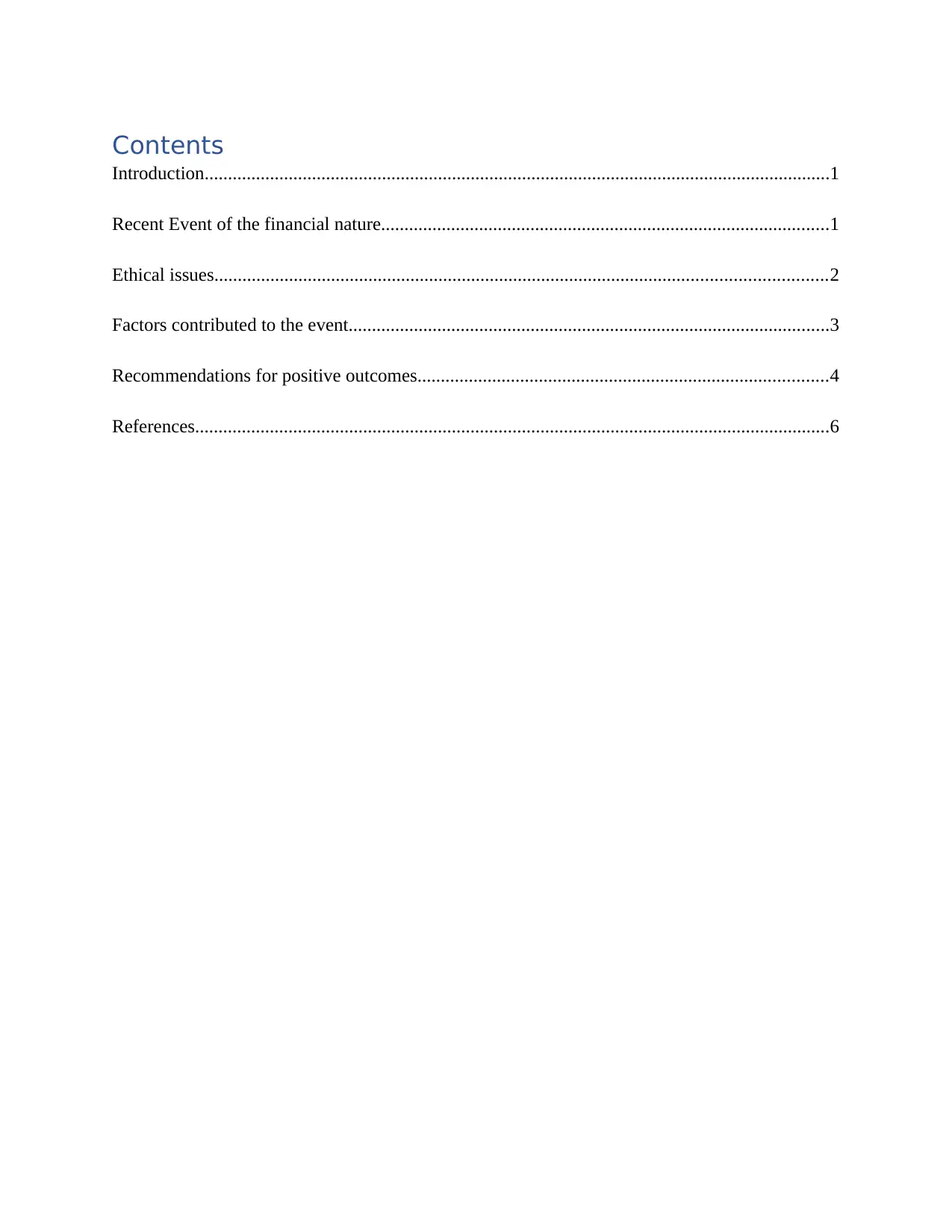
Contents
Introduction......................................................................................................................................1
Recent Event of the financial nature................................................................................................1
Ethical issues...................................................................................................................................2
Factors contributed to the event.......................................................................................................3
Recommendations for positive outcomes........................................................................................4
References........................................................................................................................................6
Introduction......................................................................................................................................1
Recent Event of the financial nature................................................................................................1
Ethical issues...................................................................................................................................2
Factors contributed to the event.......................................................................................................3
Recommendations for positive outcomes........................................................................................4
References........................................................................................................................................6
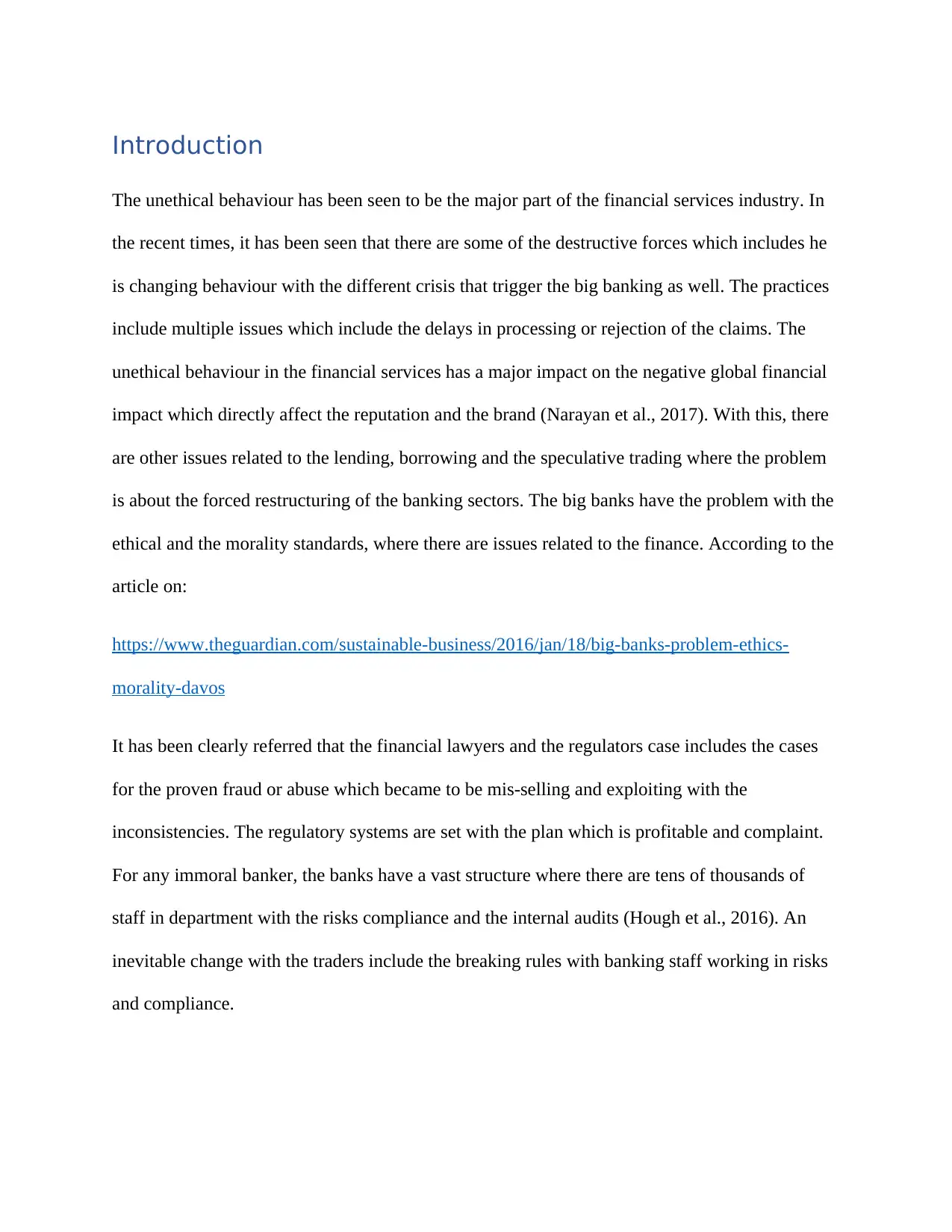
Introduction
The unethical behaviour has been seen to be the major part of the financial services industry. In
the recent times, it has been seen that there are some of the destructive forces which includes he
is changing behaviour with the different crisis that trigger the big banking as well. The practices
include multiple issues which include the delays in processing or rejection of the claims. The
unethical behaviour in the financial services has a major impact on the negative global financial
impact which directly affect the reputation and the brand (Narayan et al., 2017). With this, there
are other issues related to the lending, borrowing and the speculative trading where the problem
is about the forced restructuring of the banking sectors. The big banks have the problem with the
ethical and the morality standards, where there are issues related to the finance. According to the
article on:
https://www.theguardian.com/sustainable-business/2016/jan/18/big-banks-problem-ethics-
morality-davos
It has been clearly referred that the financial lawyers and the regulators case includes the cases
for the proven fraud or abuse which became to be mis-selling and exploiting with the
inconsistencies. The regulatory systems are set with the plan which is profitable and complaint.
For any immoral banker, the banks have a vast structure where there are tens of thousands of
staff in department with the risks compliance and the internal audits (Hough et al., 2016). An
inevitable change with the traders include the breaking rules with banking staff working in risks
and compliance.
The unethical behaviour has been seen to be the major part of the financial services industry. In
the recent times, it has been seen that there are some of the destructive forces which includes he
is changing behaviour with the different crisis that trigger the big banking as well. The practices
include multiple issues which include the delays in processing or rejection of the claims. The
unethical behaviour in the financial services has a major impact on the negative global financial
impact which directly affect the reputation and the brand (Narayan et al., 2017). With this, there
are other issues related to the lending, borrowing and the speculative trading where the problem
is about the forced restructuring of the banking sectors. The big banks have the problem with the
ethical and the morality standards, where there are issues related to the finance. According to the
article on:
https://www.theguardian.com/sustainable-business/2016/jan/18/big-banks-problem-ethics-
morality-davos
It has been clearly referred that the financial lawyers and the regulators case includes the cases
for the proven fraud or abuse which became to be mis-selling and exploiting with the
inconsistencies. The regulatory systems are set with the plan which is profitable and complaint.
For any immoral banker, the banks have a vast structure where there are tens of thousands of
staff in department with the risks compliance and the internal audits (Hough et al., 2016). An
inevitable change with the traders include the breaking rules with banking staff working in risks
and compliance.
⊘ This is a preview!⊘
Do you want full access?
Subscribe today to unlock all pages.

Trusted by 1+ million students worldwide
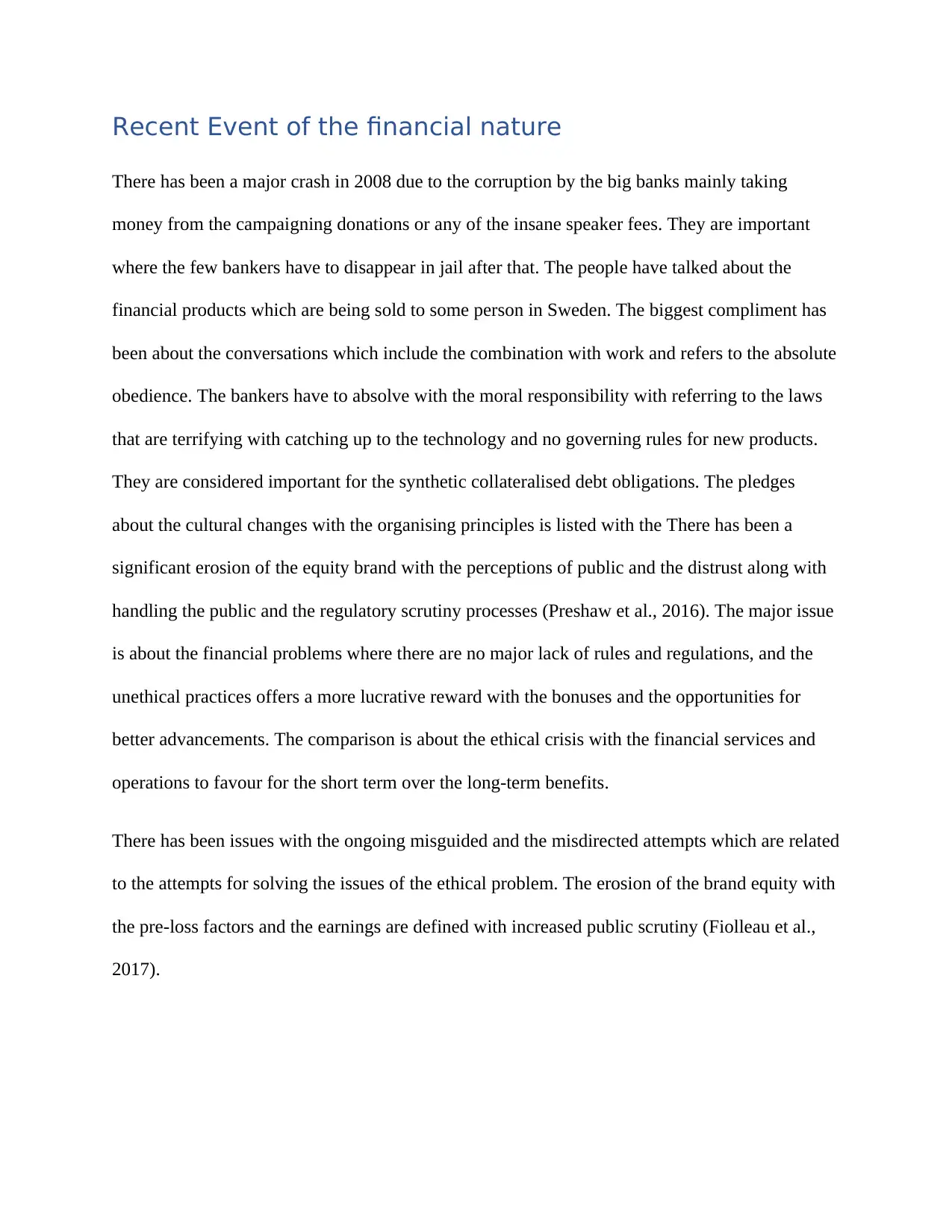
Recent Event of the financial nature
There has been a major crash in 2008 due to the corruption by the big banks mainly taking
money from the campaigning donations or any of the insane speaker fees. They are important
where the few bankers have to disappear in jail after that. The people have talked about the
financial products which are being sold to some person in Sweden. The biggest compliment has
been about the conversations which include the combination with work and refers to the absolute
obedience. The bankers have to absolve with the moral responsibility with referring to the laws
that are terrifying with catching up to the technology and no governing rules for new products.
They are considered important for the synthetic collateralised debt obligations. The pledges
about the cultural changes with the organising principles is listed with the There has been a
significant erosion of the equity brand with the perceptions of public and the distrust along with
handling the public and the regulatory scrutiny processes (Preshaw et al., 2016). The major issue
is about the financial problems where there are no major lack of rules and regulations, and the
unethical practices offers a more lucrative reward with the bonuses and the opportunities for
better advancements. The comparison is about the ethical crisis with the financial services and
operations to favour for the short term over the long-term benefits.
There has been issues with the ongoing misguided and the misdirected attempts which are related
to the attempts for solving the issues of the ethical problem. The erosion of the brand equity with
the pre-loss factors and the earnings are defined with increased public scrutiny (Fiolleau et al.,
2017).
There has been a major crash in 2008 due to the corruption by the big banks mainly taking
money from the campaigning donations or any of the insane speaker fees. They are important
where the few bankers have to disappear in jail after that. The people have talked about the
financial products which are being sold to some person in Sweden. The biggest compliment has
been about the conversations which include the combination with work and refers to the absolute
obedience. The bankers have to absolve with the moral responsibility with referring to the laws
that are terrifying with catching up to the technology and no governing rules for new products.
They are considered important for the synthetic collateralised debt obligations. The pledges
about the cultural changes with the organising principles is listed with the There has been a
significant erosion of the equity brand with the perceptions of public and the distrust along with
handling the public and the regulatory scrutiny processes (Preshaw et al., 2016). The major issue
is about the financial problems where there are no major lack of rules and regulations, and the
unethical practices offers a more lucrative reward with the bonuses and the opportunities for
better advancements. The comparison is about the ethical crisis with the financial services and
operations to favour for the short term over the long-term benefits.
There has been issues with the ongoing misguided and the misdirected attempts which are related
to the attempts for solving the issues of the ethical problem. The erosion of the brand equity with
the pre-loss factors and the earnings are defined with increased public scrutiny (Fiolleau et al.,
2017).
Paraphrase This Document
Need a fresh take? Get an instant paraphrase of this document with our AI Paraphraser
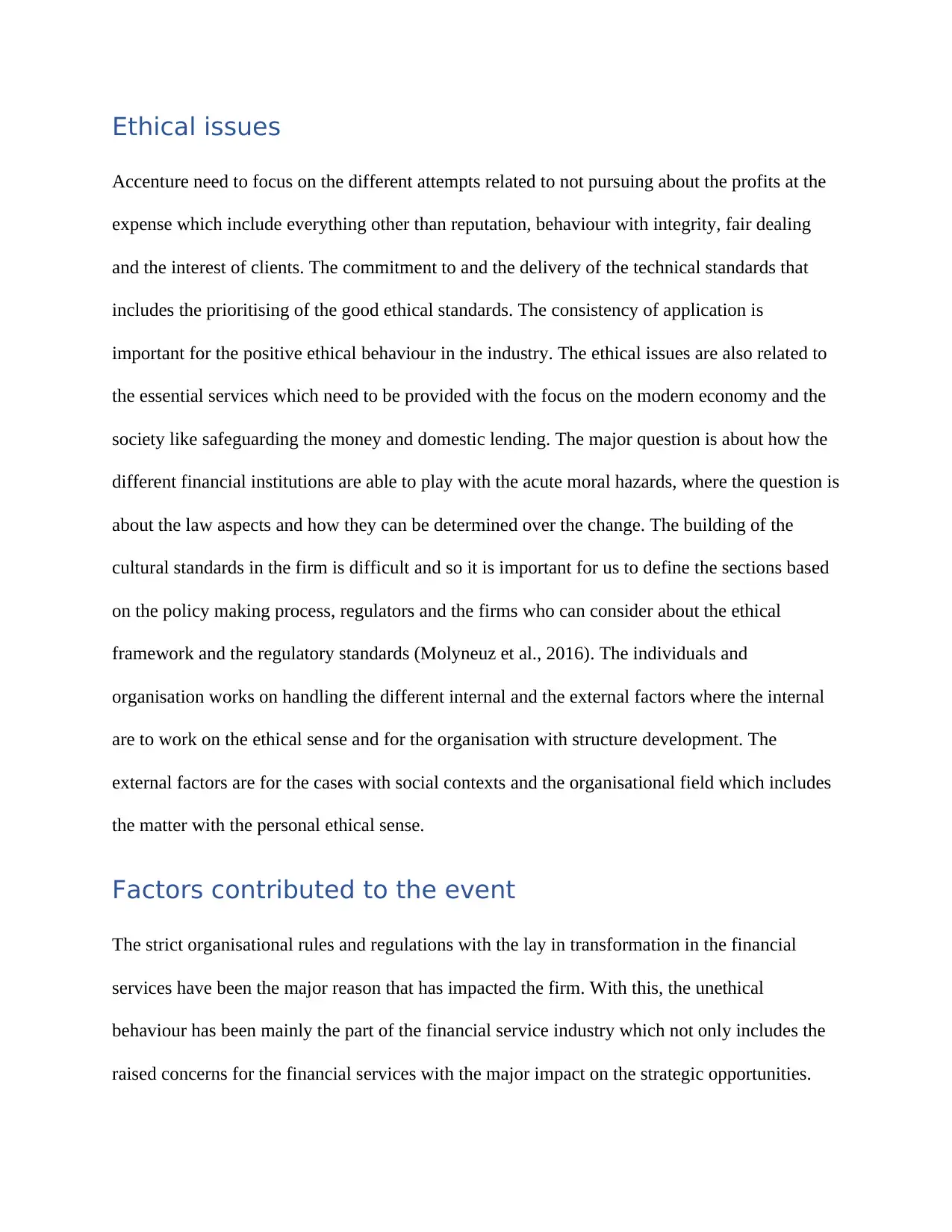
Ethical issues
Accenture need to focus on the different attempts related to not pursuing about the profits at the
expense which include everything other than reputation, behaviour with integrity, fair dealing
and the interest of clients. The commitment to and the delivery of the technical standards that
includes the prioritising of the good ethical standards. The consistency of application is
important for the positive ethical behaviour in the industry. The ethical issues are also related to
the essential services which need to be provided with the focus on the modern economy and the
society like safeguarding the money and domestic lending. The major question is about how the
different financial institutions are able to play with the acute moral hazards, where the question is
about the law aspects and how they can be determined over the change. The building of the
cultural standards in the firm is difficult and so it is important for us to define the sections based
on the policy making process, regulators and the firms who can consider about the ethical
framework and the regulatory standards (Molyneuz et al., 2016). The individuals and
organisation works on handling the different internal and the external factors where the internal
are to work on the ethical sense and for the organisation with structure development. The
external factors are for the cases with social contexts and the organisational field which includes
the matter with the personal ethical sense.
Factors contributed to the event
The strict organisational rules and regulations with the lay in transformation in the financial
services have been the major reason that has impacted the firm. With this, the unethical
behaviour has been mainly the part of the financial service industry which not only includes the
raised concerns for the financial services with the major impact on the strategic opportunities.
Accenture need to focus on the different attempts related to not pursuing about the profits at the
expense which include everything other than reputation, behaviour with integrity, fair dealing
and the interest of clients. The commitment to and the delivery of the technical standards that
includes the prioritising of the good ethical standards. The consistency of application is
important for the positive ethical behaviour in the industry. The ethical issues are also related to
the essential services which need to be provided with the focus on the modern economy and the
society like safeguarding the money and domestic lending. The major question is about how the
different financial institutions are able to play with the acute moral hazards, where the question is
about the law aspects and how they can be determined over the change. The building of the
cultural standards in the firm is difficult and so it is important for us to define the sections based
on the policy making process, regulators and the firms who can consider about the ethical
framework and the regulatory standards (Molyneuz et al., 2016). The individuals and
organisation works on handling the different internal and the external factors where the internal
are to work on the ethical sense and for the organisation with structure development. The
external factors are for the cases with social contexts and the organisational field which includes
the matter with the personal ethical sense.
Factors contributed to the event
The strict organisational rules and regulations with the lay in transformation in the financial
services have been the major reason that has impacted the firm. With this, the unethical
behaviour has been mainly the part of the financial service industry which not only includes the
raised concerns for the financial services with the major impact on the strategic opportunities.
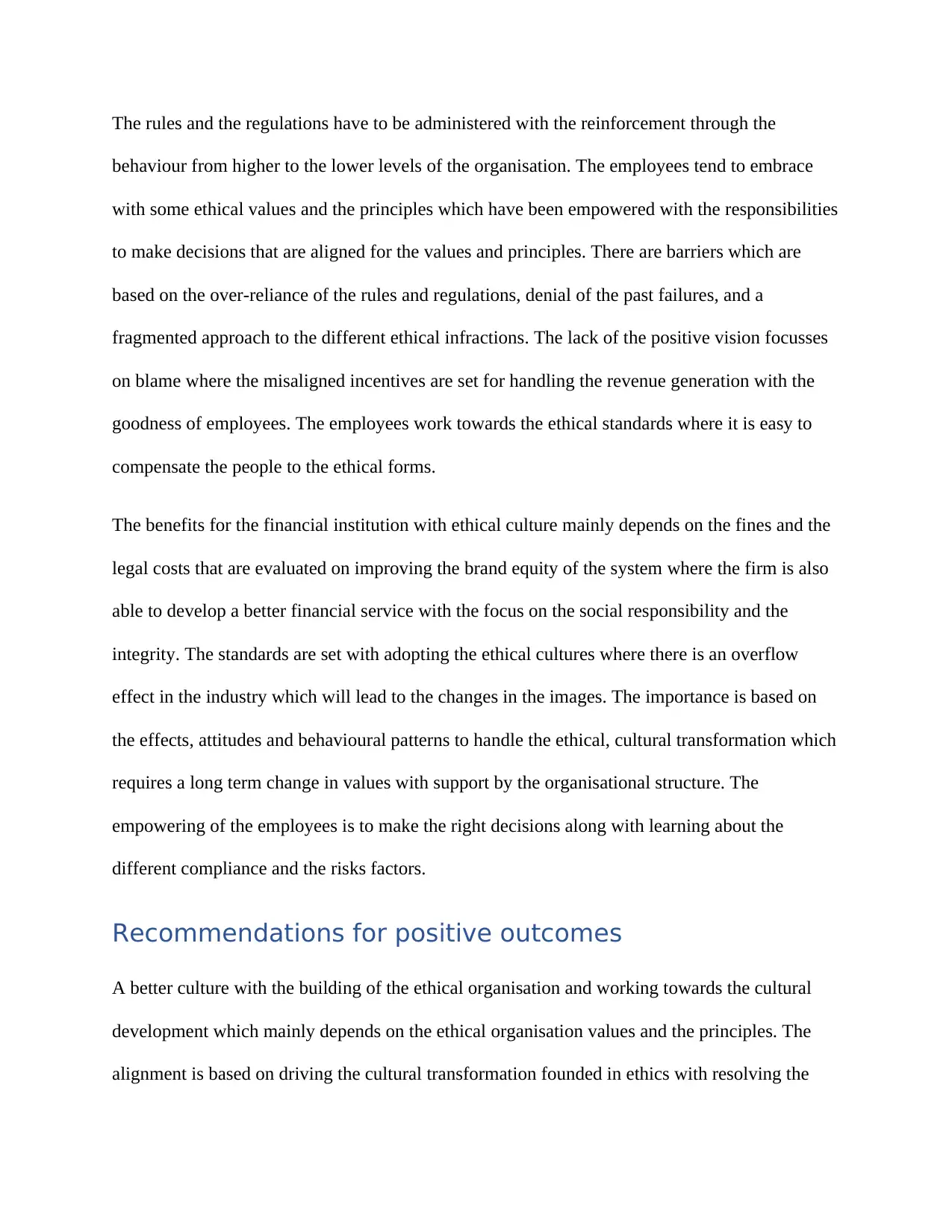
The rules and the regulations have to be administered with the reinforcement through the
behaviour from higher to the lower levels of the organisation. The employees tend to embrace
with some ethical values and the principles which have been empowered with the responsibilities
to make decisions that are aligned for the values and principles. There are barriers which are
based on the over-reliance of the rules and regulations, denial of the past failures, and a
fragmented approach to the different ethical infractions. The lack of the positive vision focusses
on blame where the misaligned incentives are set for handling the revenue generation with the
goodness of employees. The employees work towards the ethical standards where it is easy to
compensate the people to the ethical forms.
The benefits for the financial institution with ethical culture mainly depends on the fines and the
legal costs that are evaluated on improving the brand equity of the system where the firm is also
able to develop a better financial service with the focus on the social responsibility and the
integrity. The standards are set with adopting the ethical cultures where there is an overflow
effect in the industry which will lead to the changes in the images. The importance is based on
the effects, attitudes and behavioural patterns to handle the ethical, cultural transformation which
requires a long term change in values with support by the organisational structure. The
empowering of the employees is to make the right decisions along with learning about the
different compliance and the risks factors.
Recommendations for positive outcomes
A better culture with the building of the ethical organisation and working towards the cultural
development which mainly depends on the ethical organisation values and the principles. The
alignment is based on driving the cultural transformation founded in ethics with resolving the
behaviour from higher to the lower levels of the organisation. The employees tend to embrace
with some ethical values and the principles which have been empowered with the responsibilities
to make decisions that are aligned for the values and principles. There are barriers which are
based on the over-reliance of the rules and regulations, denial of the past failures, and a
fragmented approach to the different ethical infractions. The lack of the positive vision focusses
on blame where the misaligned incentives are set for handling the revenue generation with the
goodness of employees. The employees work towards the ethical standards where it is easy to
compensate the people to the ethical forms.
The benefits for the financial institution with ethical culture mainly depends on the fines and the
legal costs that are evaluated on improving the brand equity of the system where the firm is also
able to develop a better financial service with the focus on the social responsibility and the
integrity. The standards are set with adopting the ethical cultures where there is an overflow
effect in the industry which will lead to the changes in the images. The importance is based on
the effects, attitudes and behavioural patterns to handle the ethical, cultural transformation which
requires a long term change in values with support by the organisational structure. The
empowering of the employees is to make the right decisions along with learning about the
different compliance and the risks factors.
Recommendations for positive outcomes
A better culture with the building of the ethical organisation and working towards the cultural
development which mainly depends on the ethical organisation values and the principles. The
alignment is based on driving the cultural transformation founded in ethics with resolving the
⊘ This is a preview!⊘
Do you want full access?
Subscribe today to unlock all pages.

Trusted by 1+ million students worldwide
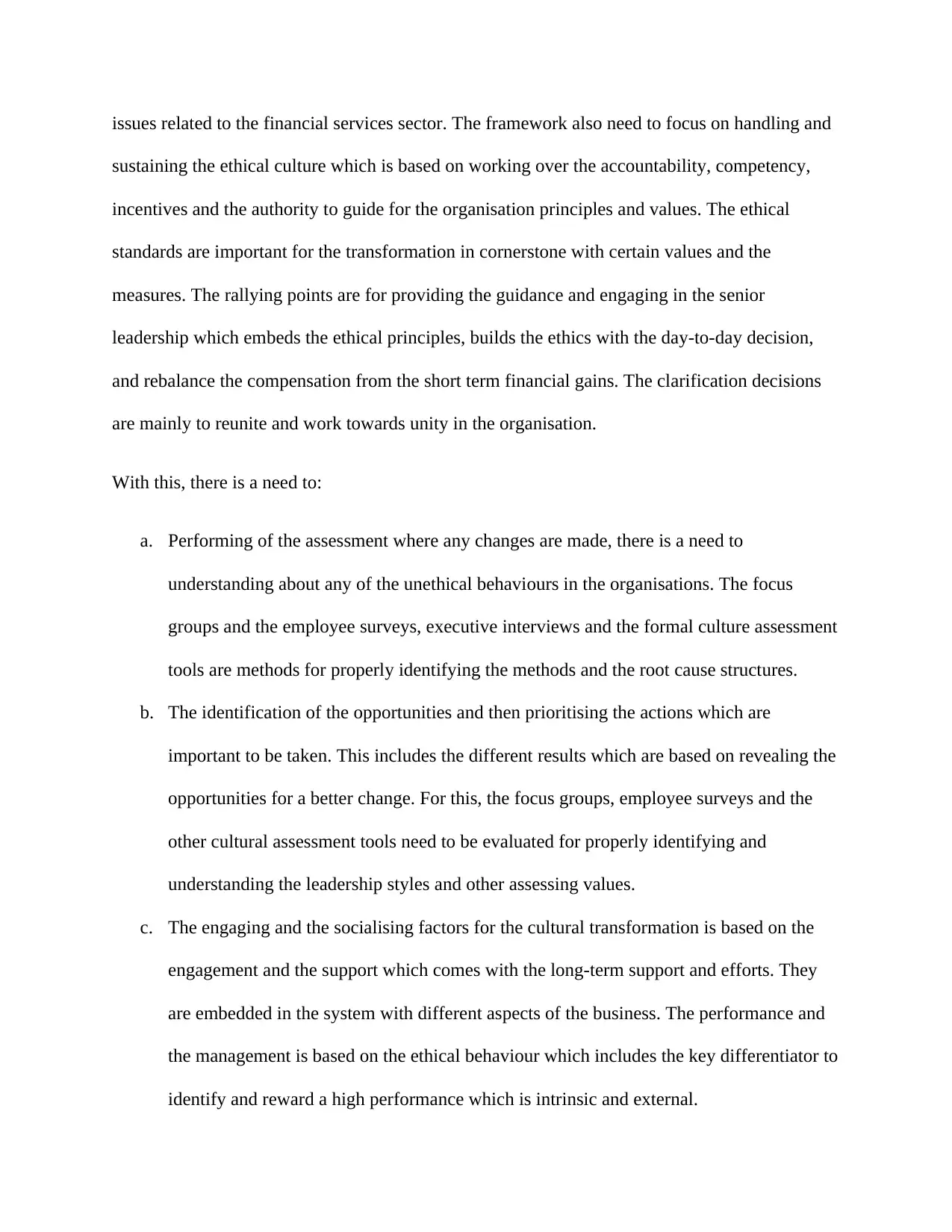
issues related to the financial services sector. The framework also need to focus on handling and
sustaining the ethical culture which is based on working over the accountability, competency,
incentives and the authority to guide for the organisation principles and values. The ethical
standards are important for the transformation in cornerstone with certain values and the
measures. The rallying points are for providing the guidance and engaging in the senior
leadership which embeds the ethical principles, builds the ethics with the day-to-day decision,
and rebalance the compensation from the short term financial gains. The clarification decisions
are mainly to reunite and work towards unity in the organisation.
With this, there is a need to:
a. Performing of the assessment where any changes are made, there is a need to
understanding about any of the unethical behaviours in the organisations. The focus
groups and the employee surveys, executive interviews and the formal culture assessment
tools are methods for properly identifying the methods and the root cause structures.
b. The identification of the opportunities and then prioritising the actions which are
important to be taken. This includes the different results which are based on revealing the
opportunities for a better change. For this, the focus groups, employee surveys and the
other cultural assessment tools need to be evaluated for properly identifying and
understanding the leadership styles and other assessing values.
c. The engaging and the socialising factors for the cultural transformation is based on the
engagement and the support which comes with the long-term support and efforts. They
are embedded in the system with different aspects of the business. The performance and
the management is based on the ethical behaviour which includes the key differentiator to
identify and reward a high performance which is intrinsic and external.
sustaining the ethical culture which is based on working over the accountability, competency,
incentives and the authority to guide for the organisation principles and values. The ethical
standards are important for the transformation in cornerstone with certain values and the
measures. The rallying points are for providing the guidance and engaging in the senior
leadership which embeds the ethical principles, builds the ethics with the day-to-day decision,
and rebalance the compensation from the short term financial gains. The clarification decisions
are mainly to reunite and work towards unity in the organisation.
With this, there is a need to:
a. Performing of the assessment where any changes are made, there is a need to
understanding about any of the unethical behaviours in the organisations. The focus
groups and the employee surveys, executive interviews and the formal culture assessment
tools are methods for properly identifying the methods and the root cause structures.
b. The identification of the opportunities and then prioritising the actions which are
important to be taken. This includes the different results which are based on revealing the
opportunities for a better change. For this, the focus groups, employee surveys and the
other cultural assessment tools need to be evaluated for properly identifying and
understanding the leadership styles and other assessing values.
c. The engaging and the socialising factors for the cultural transformation is based on the
engagement and the support which comes with the long-term support and efforts. They
are embedded in the system with different aspects of the business. The performance and
the management is based on the ethical behaviour which includes the key differentiator to
identify and reward a high performance which is intrinsic and external.
Paraphrase This Document
Need a fresh take? Get an instant paraphrase of this document with our AI Paraphraser

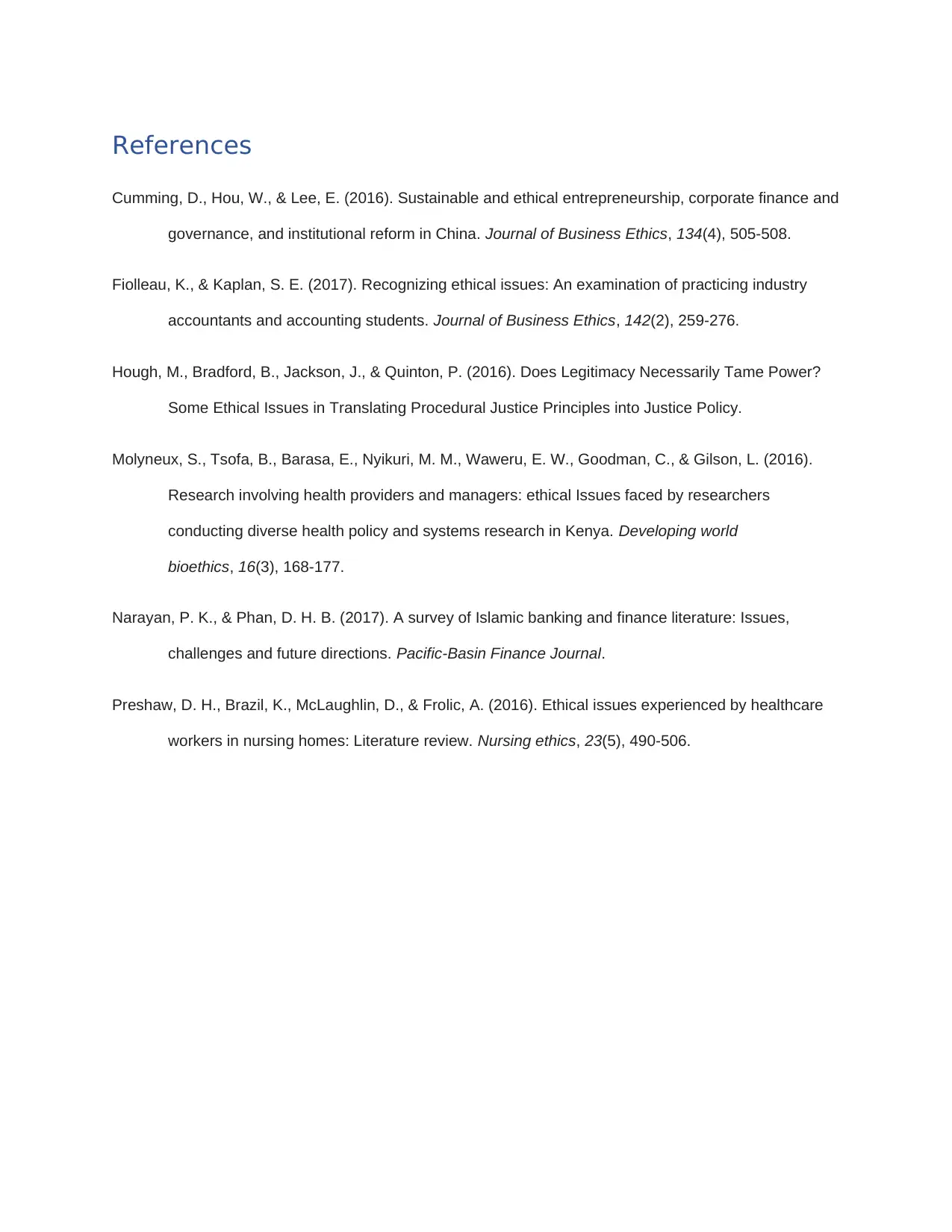
References
Cumming, D., Hou, W., & Lee, E. (2016). Sustainable and ethical entrepreneurship, corporate finance and
governance, and institutional reform in China. Journal of Business Ethics, 134(4), 505-508.
Fiolleau, K., & Kaplan, S. E. (2017). Recognizing ethical issues: An examination of practicing industry
accountants and accounting students. Journal of Business Ethics, 142(2), 259-276.
Hough, M., Bradford, B., Jackson, J., & Quinton, P. (2016). Does Legitimacy Necessarily Tame Power?
Some Ethical Issues in Translating Procedural Justice Principles into Justice Policy.
Molyneux, S., Tsofa, B., Barasa, E., Nyikuri, M. M., Waweru, E. W., Goodman, C., & Gilson, L. (2016).
Research involving health providers and managers: ethical Issues faced by researchers
conducting diverse health policy and systems research in Kenya. Developing world
bioethics, 16(3), 168-177.
Narayan, P. K., & Phan, D. H. B. (2017). A survey of Islamic banking and finance literature: Issues,
challenges and future directions. Pacific-Basin Finance Journal.
Preshaw, D. H., Brazil, K., McLaughlin, D., & Frolic, A. (2016). Ethical issues experienced by healthcare
workers in nursing homes: Literature review. Nursing ethics, 23(5), 490-506.
Cumming, D., Hou, W., & Lee, E. (2016). Sustainable and ethical entrepreneurship, corporate finance and
governance, and institutional reform in China. Journal of Business Ethics, 134(4), 505-508.
Fiolleau, K., & Kaplan, S. E. (2017). Recognizing ethical issues: An examination of practicing industry
accountants and accounting students. Journal of Business Ethics, 142(2), 259-276.
Hough, M., Bradford, B., Jackson, J., & Quinton, P. (2016). Does Legitimacy Necessarily Tame Power?
Some Ethical Issues in Translating Procedural Justice Principles into Justice Policy.
Molyneux, S., Tsofa, B., Barasa, E., Nyikuri, M. M., Waweru, E. W., Goodman, C., & Gilson, L. (2016).
Research involving health providers and managers: ethical Issues faced by researchers
conducting diverse health policy and systems research in Kenya. Developing world
bioethics, 16(3), 168-177.
Narayan, P. K., & Phan, D. H. B. (2017). A survey of Islamic banking and finance literature: Issues,
challenges and future directions. Pacific-Basin Finance Journal.
Preshaw, D. H., Brazil, K., McLaughlin, D., & Frolic, A. (2016). Ethical issues experienced by healthcare
workers in nursing homes: Literature review. Nursing ethics, 23(5), 490-506.
⊘ This is a preview!⊘
Do you want full access?
Subscribe today to unlock all pages.

Trusted by 1+ million students worldwide
1 out of 9
Related Documents
Your All-in-One AI-Powered Toolkit for Academic Success.
+13062052269
info@desklib.com
Available 24*7 on WhatsApp / Email
![[object Object]](/_next/static/media/star-bottom.7253800d.svg)
Unlock your academic potential
Copyright © 2020–2026 A2Z Services. All Rights Reserved. Developed and managed by ZUCOL.





